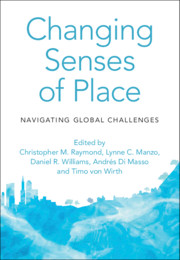Book contents
- Changing Senses of Place
- Changing Senses of Place
- Copyright page
- Dedication
- Contents
- Contributors
- Foreword
- Preface
- Acknowledgements
- Introduction
- Part I Climate Change and Ecological Regime Shifts
- Part II Migration, Mobility and Belonging
- Part III Renewable Energy Transitions
- Part IV Nationalism and Competing Territorial Claims
- Part V Urban Change
- 16 Uncovering Competing Senses of Place in a Context of Rapid Urban Change
- 17 Gentrification and the Creative Destruction of Sense of Place
- 18 Looking at the Urban Invisibles
- Part VI Technological and Legal Transformations
- Part VII Design and Planning Strategies for Changing Senses of Place
- Part VIII Conclusion
- Index
- References
18 - Looking at the Urban Invisibles
Appropriation of Space and Senses of Place by People Living in the Streets
from Part V - Urban Change
Published online by Cambridge University Press: 15 July 2021
- Changing Senses of Place
- Changing Senses of Place
- Copyright page
- Dedication
- Contents
- Contributors
- Foreword
- Preface
- Acknowledgements
- Introduction
- Part I Climate Change and Ecological Regime Shifts
- Part II Migration, Mobility and Belonging
- Part III Renewable Energy Transitions
- Part IV Nationalism and Competing Territorial Claims
- Part V Urban Change
- 16 Uncovering Competing Senses of Place in a Context of Rapid Urban Change
- 17 Gentrification and the Creative Destruction of Sense of Place
- 18 Looking at the Urban Invisibles
- Part VI Technological and Legal Transformations
- Part VII Design and Planning Strategies for Changing Senses of Place
- Part VIII Conclusion
- Index
- References
Summary
We seek to analyse the appropriation of space by people living in the streets (PLS), focusing on Brazilian cities, from a materialistic, historical and dialectical conception of reality, problematizing traditional conceptions of sense of place. The spaces in the city that need to be appropriated as a condition of survival are the same ones that reject PLS as subjects, and the set of elements they can appropriate and that unfold in multiple senses of place is largely determined by urban social and racial inequalities. Thus, to understand senses of place by this group, we must pay attention to the historical determinations in the process of appropriation–objectivation of PLS. In this sense, because of its power to synthesise the humanization–alienation dialectics taking into account both social structures and the elements of people’s living spaces, appropriation of space is a category that allows us to historicize and pluralize senses of place.
Keywords
- Type
- Chapter
- Information
- Changing Senses of PlaceNavigating Global Challenges, pp. 234 - 244Publisher: Cambridge University PressPrint publication year: 2021

